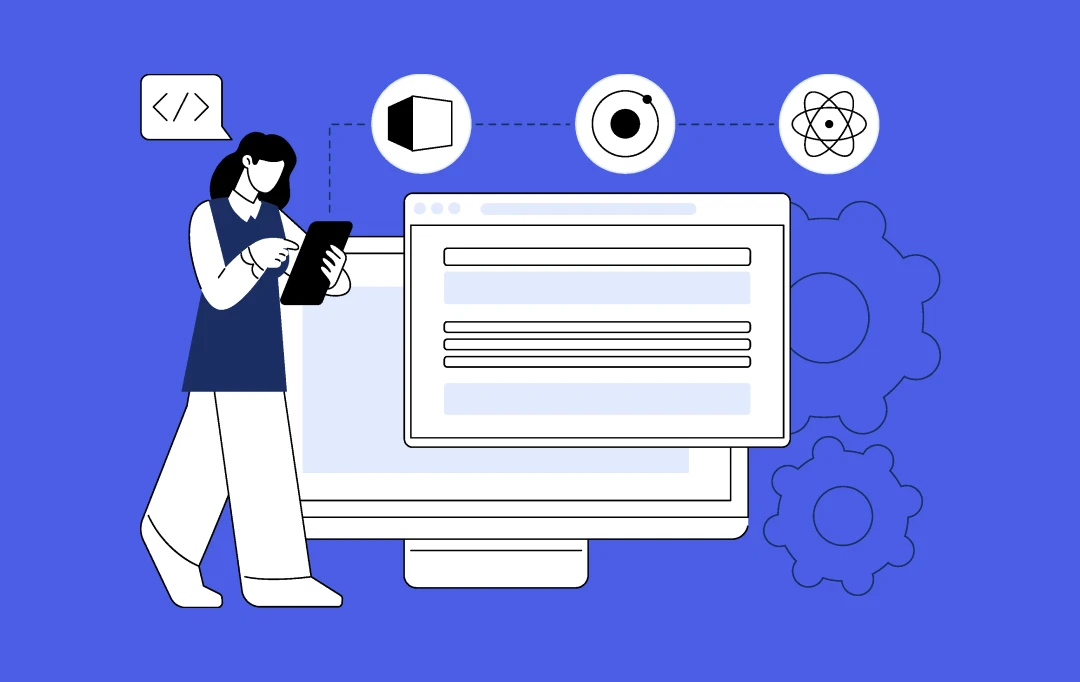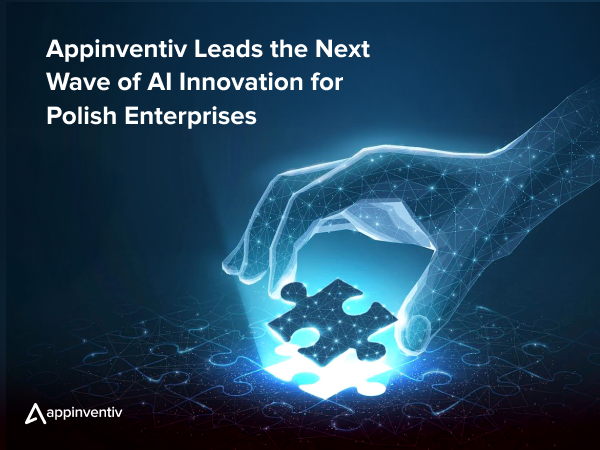- AI in the Automotive Market Forecast
- Impact of AI on the Automotive Industry
- Business Benefits of AI in the Automotive Industry
- For Businesses
- For Consumers
- Use Cases of AI in the Automotive Industry
- Driver Assistance
- Autonomous Vehicles
- Driver Monitoring
- Artificial Intelligence in Car Manufacturing
- Personal Assistant
- Passenger Experience
- Supply Chain Management
- Automotive Insurance
- Quality Control
- Connected Cars
- AI in Designing
- How AI Is Transforming Automotive Dealerships & Retail
- Generative AI-powered Recommendations
- AI Driven Chatbots & Virtual Assistants
- Smart Financing Tools
- Dynamic Pricing & Offers
- AI Integration in the Automotive Industry: 4 Leading Car Companies Driving Innovation
- Tesla
- BMW
- Wamyo
- Nvidia
- Future of AI in the Automotive Industry
- What is Full Vehicle Automation & Connectivity
- Innovations by AI Pioneers in Automotive and Connected Ecosystem Vision
- Implementation Challenges of AI in the Automotive Industry and Solutions to Overcome Them
- Data Privacy and Security
- Shortage of Skilled AI Talent
- Building User Trust
- Integration with Legacy Systems
- Embrace the Power of AI in Your Automotive Business with Appinventiv
- FAQs
Key takeaways:
- Artificial intelligence is reshaping the auto industry. The technology is making cars smarter, production faster, and services more customer-focused.
- Dealerships using AI see real results, with higher showroom visits, stronger sales conversions, and improved repeat purchases.
- For automakers, AI streamlines design, cuts costs, and helps predict issues before they disrupt operations.
- For drivers, it means safer roads, personalized in-car experiences, and vehicles that can “care” for themselves.
- With market growth projected to triple by 2027, AI is no longer optional for the automotive sector it’s becoming the standard.
Not long ago, the idea of cars driving themselves or mechanics being alerted before a part breaks felt like pure science fiction. Today, thanks to Artificial Intelligence, it’s fast becoming the norm. From design studios to dealership floors, the automotive industry is accelerating its digital transformation, and AI is at the wheel.
From autonomous driving and smart manufacturing to predictive maintenance and personalized in-car experiences, AI is reshaping how vehicles are built, sold, and even experienced. And the impact isn’t just technical it’s financial.
In 2024, CDK surveyed nearly 250 North American executives and heads of automotive dealerships to understand how AI is perceived in the auto retail industry. AI-enabled dealerships achieve:
- 27% higher showroom appointment set rates
- 26% lead-to-sale conversion rate
- 24% increase in repurchase rates
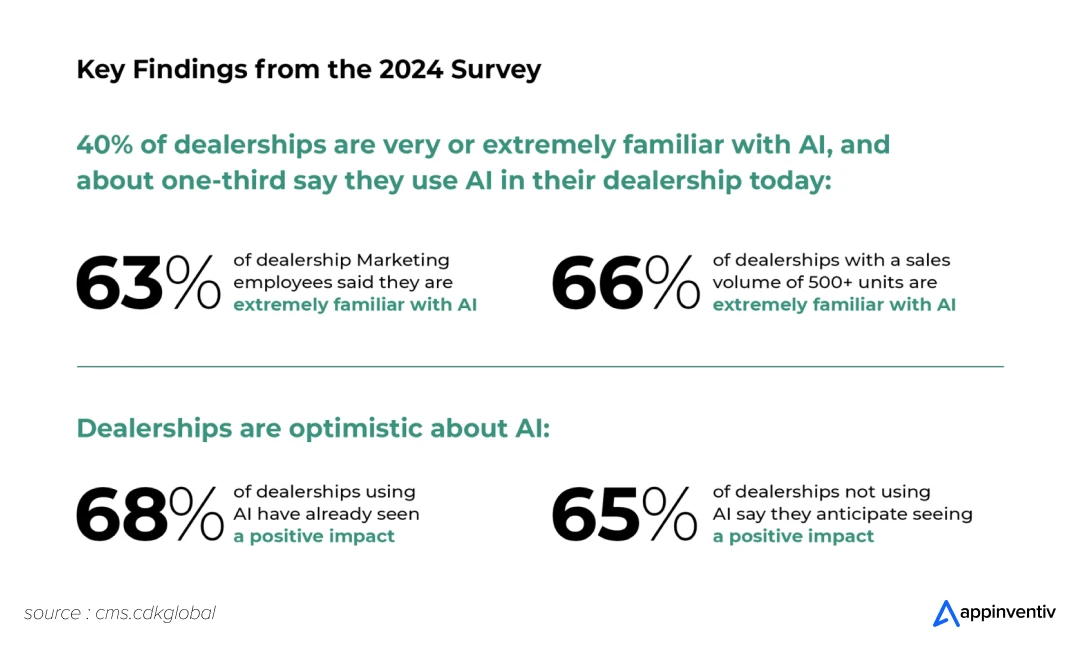
Interested in learning more about AI’s role in the automotive industry? Then this blog is for you. In this blog, we will discover some of the amazing benefits and use cases of AI in the automotive industry. We will also explore the real-world examples of leading car companies using AI in their production processes, and also throw light on the future aspects of the technology. But first, let’s get a glimpse at the AI in the automotive market.
Ready to take the next step?
AI in the Automotive Market Forecast
The global automotive AI market is poised to grow from $2.3 billion in 2022 to $7 billion
by 2027. This growth is expected at a CAGR of 24.1%.
Meanwhile, 68% of auto dealerships reported that Al has impacted their operations for good, helping them enhance customer satisfaction, achieve financial objectives, and improve internal workflows.
According to McKinsey, autonomous driving could generate $300 billion to $400 billion in revenue by 2035. New research reveals what’s needed to win in the fast-changing passenger car market.
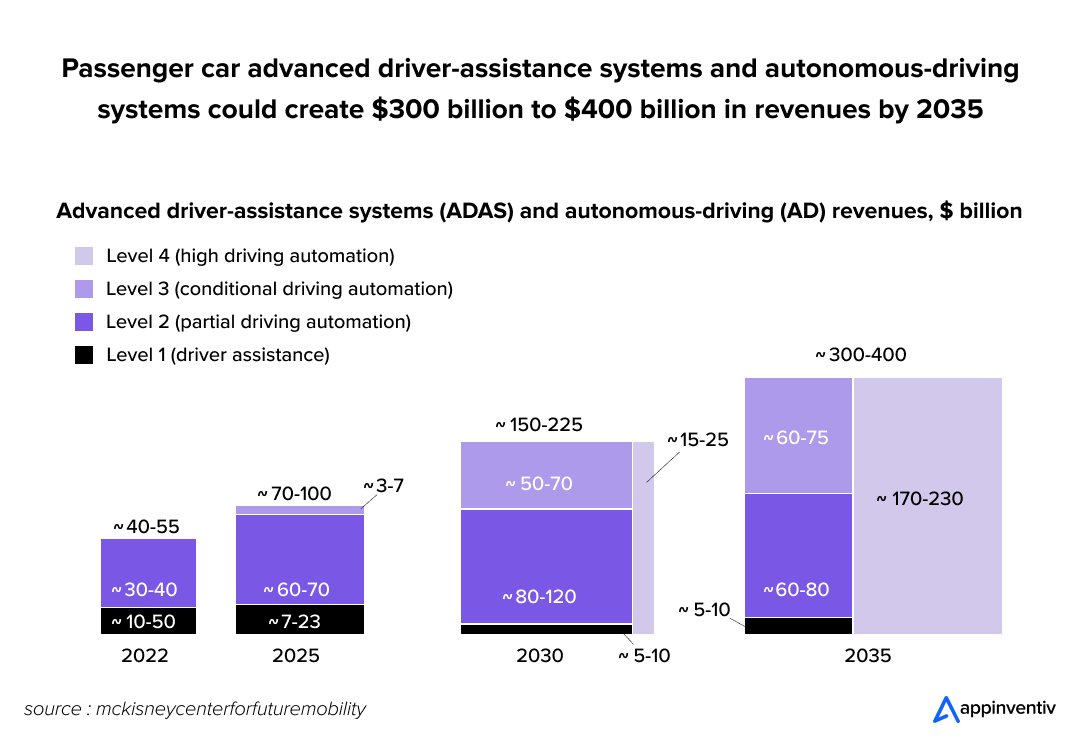
This is more than just technological evolution; it’s a business revolution. Automakers, suppliers, and tech companies are rapidly embracing AI not just to stay relevant, but to lead the future of mobility. As cars get smarter, the businesses behind them are becoming more agile, data-driven, and customer-focused by utilizing AI in the automotive industry.
Let’s discuss some significant benefits and use cases of artificial intelligence in the automotive industry.
Impact of AI on the Automotive Industry
AI automotive is revolutionizing the industry by boosting safety, efficiency, and innovation. Autonomous vehicles driven by AI transform the transportation industry, decreasing accidents and alleviating traffic congestion.
For instance, AI-powered predictive maintenance extends vehicle lifespan by identifying issues early. Additionally, AI elevates the in-car experience with advanced driver-assistance systems (ADAS), voice recognition, and tailored infotainment. It also provides data-driven insights that improve decision-making in vehicle design and development.
The impact of AI is evident across multiple areas of the automotive industry.
- AI in the Manufacturing Process: AI has revolutionized manufacturing by enabling automated robotics and real-time data collection. This streamlines production, enhances quality control, and helps reduce operational costs and waste.
- AI in Dealership Services: Machine learning tools and chatbots in the automotive industry provide 24/7 customer service and analyze customer data to offer personalized vehicle suggestions and sales opportunities.
- AI in Dealership Marketing: AI enables hyper-personalized campaigns. Platforms like Fullpath show how dealerships use AI-driven marketing automation to nurture leads, segment buyers, and optimize ad spend. The result is more targeted outreach and higher conversion rates.
In short, AI automotive is propelling the industry towards a smarter, safer, and more sustainable future. Government support and favorable policies are also pivotal in boosting AI integration across the sector. Additionally, growing investments in AI R&D and strategic partnerships between automakers and tech companies are accelerating innovation, leading to the rapid development of intelligent, AI-powered automotive solutions.
“The value of the company is primarily on the basis of autonomy. That’s really, I think, the main driver of our value.”
Elon Musk, CEO of Tesla
Business Benefits of AI in the Automotive Industry
The automotive industry is increasingly adopting AI technology to streamline operations and improve overall vehicle performance. Artificial intelligence has completely transformed how vehicles are designed, manufactured, and driven by tapping into the potential of big data, IoT, AI, and ML. From autonomous vehicles to advanced safety systems, the benefits of AI in the automotive industry are enormous.
Let’s take a closer look at some of AI’s key benefits in the automobile industry, which are categorized into two aspects “for businesses” and “for consumers”:
For Businesses
Streamlined and Accelerated Production
Car companies are discovering that AI can design better parts faster than teams of engineers working for months. Generative AI is supporting faster, more intuitive, and more efficient vehicle design by supporting rapid prototyping and optimization of components.
Want to design a lighter door handle? AI can generate hundreds of options in minutes, test them virtually, and pick the best ones. What used to take months now happens in a twinkling eye.
Intelligent Supply Chain and Inventory Optimization
Managing car parts from 500+ suppliers across the globe used to give logistics managers nightmares. Now AI in cars predicts which parts will be needed when, spots potential delays before they happen, and automatically reorders inventory. The result? Early identification of potential failures. Improved longevity of expensive equipment. Reduced maintenance costs and unplanned interruptions.
Also Read: Automotive Supply Chain Software Development – Cost & Benefits
Market Differentiation Through Advanced Customization
The leading car companies in the world are using AI to offer something intelligent and innovative that their competitors can’t: true customization at scale. Want your car’s interior to match your home décor? AI can make that happen without the traditional cost penalty of custom manufacturing.
Reduced Operational Costs and Resource Optimization
AI delivers substantial cost savings across multiple areas. Predictive maintenance alone can reduce unexpected downtime costs by millions annually. Energy management systems cut facility costs by nearly 50%, while automated quality control reduces warranty claims and recalls. Smart workforce allocation ensures the right resources work on the right tasks, eliminating inefficiencies that drain budgets.
For Consumers
AI in Cars Knows You
AI vehicles learn your habits and adjust accordingly. Sit down, and your car automatically adjusts everything: how you like your mirrors, seat position, and temperature. Drive to work every day? Your car learns the route and can suggest faster alternatives when the road is jammed or traffic is sluggish.
AI-driven voice recognition systems understand your accent and speaking patterns, making interactions more natural and reliable than generic voice assistants.
Enhanced Safety Features and Collision Prevention
Today’s vehicles are becoming remarkably good at preventing accidents. Smart safety systems watch for pedestrians, monitor other vehicles, and take emergency action faster than human reflexes allow.
Lane departure warnings have evolved into systems that gently guide you back into your lane. Adaptive cruise control maintains safe following distances and can bring your car to a complete stop if necessary. For instance, forward collision warning combined with autobrake is associated with a 50% decrease in front-to-rear crashes and a 56% decrease in crashes with injuries. (Source: Wikipedia)
Driver monitoring systems watch for signs of fatigue or distraction, providing alerts when attention wanders or suggesting rest breaks during long drives.
Predictive Maintenance and Reliability
Since AI uses the power of IoT in automobiles, it also helps the industry with predictive maintenance. IoT systems assist in tracking vehicles’ real-time conditions by analyzing the vast trove of vehicle data, enabling managers to determine when maintenance is required.
When the IoT sensor suspects a potential issue, it alerts automobile managers to take preventive measures before it becomes a major concern. This helps avoid unexpected roadside breakdowns and major repair bills. Moreover, AI also helps reduce emissions, optimize fuel efficiency, and improve the vehicle’s overall performance.
Seamless Vehicle Discovery and Purchasing Experience
Finding the right car has transformed from a time-consuming ordeal into a streamlined digital experience. AI analyzes your lifestyle, budget, and preferences to suggest vehicles that truly match your needs.
Virtual showrooms let you explore vehicles in detail from home, while smart financing tools provide personalized loan options based on your financial situation.
In short, the entire experience of buying a new car has become a lot efficient and transparent, with AI helping both buyers and sellers make informed decisions.
Also Read: How to adopt artificial intelligence in your business? A complete guide
Use Cases of AI in the Automotive Industry
In the last couple of years, automobile experts have adopted four revolutionary trends – autonomous driving, car connectivity with data sensors, electrification, and shared mobility, better known as ACES. The collective concept of ACES fuels growth within the automotive industry, and AI is the driving force here.
The use of AI in the automotive industry is broad and diverse. From design and manufacturing to sales and maintenance, the applications of artificial intelligence can be noticed throughout a vehicle’s life cycle. This is why top-tier automotive brands strive to incorporate AI into their vehicles.

Let’s dive deeper into some of the common AI use cases in the automotive industry:
Driver Assistance
Driver assistance is one of the best uses of AI in the automotive industry. AI-enabled systems use sensors to assist with steering and pedestrian detection, monitor blind spots, and alert the driver accordingly, enabling them to take preventive measures to stay protected against road accidents. This technology is becoming a core feature in AI vehicles, enhancing safety and convenience.
The growing connection between AI and cars is paving the way for smarter, more intuitive driving experiences that adapt to real-time conditions and driver behavior. Advanced AI systems can also learn from drivers’ habits over time, improving assistance accuracy and personalizing support. As these technologies evolve, they support drivers and prepare the groundwork for fully autonomous mobility.
At Appinventiv, our team developed ActiDrive, an intelligent driver-assistance app that enhances road safety through gesture-based controls. Leveraging advanced optical recognition technology, ActiDrive allows drivers to manage the vehicle’s infotainment system without touching the screen, reducing distractions and keeping their focus where it matters most: on the road.
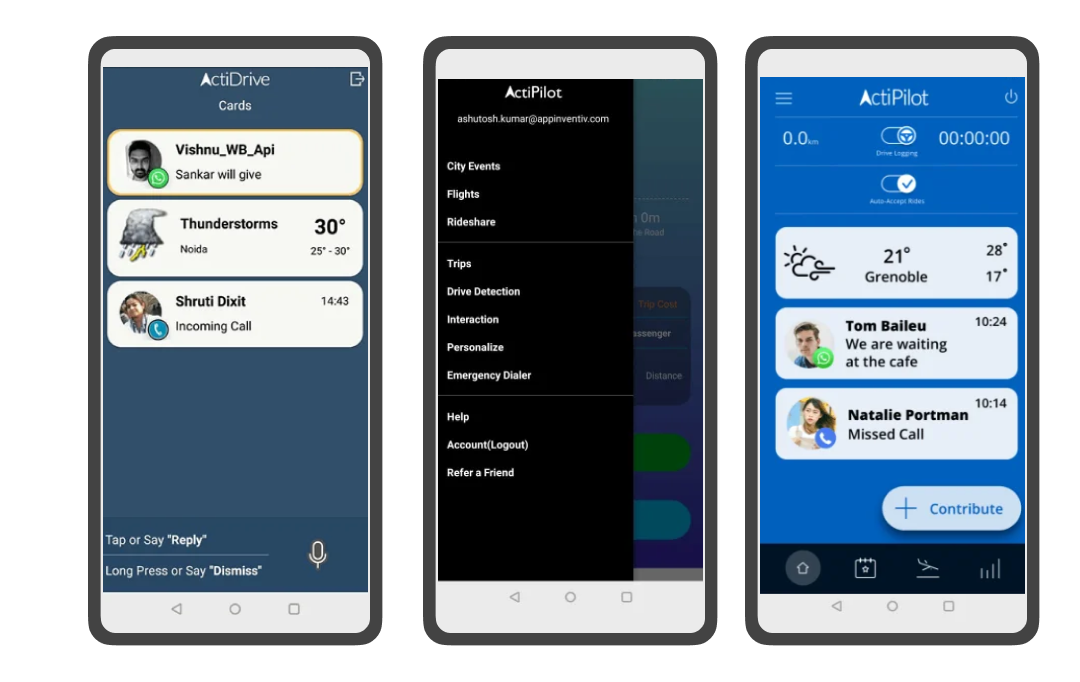
ActiDrive is more than just a control tool; It is a smart co-pilot. It tracks trips, identifies commonly traveled routes, and delivers real-time insights such as journey duration and distance, helping drivers stay informed and in control at all times.
Autonomous Vehicles
Autonomous vehicles next-generation cars equipped with self-learning and self-driving capabilities are among the most groundbreaking outcomes of artificial intelligence in the automotive space. With advanced technologies like deep learning, machine learning services and big data, these vehicles can navigate roads with minimal human input while following traffic rules and ensuring safety.
AI in car manufacturing is revolutionizing how cars are designed, built, and tested, bringing greater precision, speed, and efficiency to the production line. This broader AI integration in the automotive industry drives innovation at every stage, from predictive maintenance and smart logistics to real-time quality monitoring and supply chain optimization. While regulatory challenges still exist, the dream of fully autonomous, AI-powered mobility is no longer distant.
While regulatory challenges still exist, the dream of fully autonomous vehicle technology powered by AI is no longer distant, with self-driving capabilities already being tested and deployed in controlled environments.
Driver Monitoring
AI algorithms monitor whether the regular driver is in the car or someone else is driving and automatically adjust the mirrors, seat, and even temperature when the known user is in the driver’s seat. Additionally, AI systems track the driver’s eyes and head position to detect signs of drowsiness and alert the driver accordingly.
As part of the broader innovations in the AI automotive industry, these driver monitoring systems are enhancing safety, comfort, and personalization, making vehicles smarter and more responsive to human behavior.
Artificial Intelligence in Car Manufacturing
The automotive industry heavily relies on manufacturing, where a small error can cause serious problems. But artificial intelligence automotive solutions, like generative AI for businesses, can significantly improve car-making, making it more advanced and efficient. For instance, manual labor picks parts from conveyor belts, which is an inefficient and time-consuming way to complete the car-making process.
However, with automotive artificial intelligence, robots can autonomously pick parts, minimize human intervention, and speed up the manufacturing process. Additionally, AI in automotive manufacturing utilizes robots that alert humans in case of any unexpected machine failure, preventing mishaps. These innovations also reflect how artificial intelligence in cars shapes production and the future of driving experiences.
Personal Assistant
While automobile companies often prefer implementing third-party voice assistants like Alexa and Siri, some industry players choose to build their own voice-recognition software. Such AI-enabled personal assistance in cars helps make calls, adjust the temperature, change radio stations, play music, inform about the gas amount in the tank, and do a lot more.
Most importantly, voice recognition tools have high personalization capabilities, meaning they can remember the users’ interests and make adjustments based on their history. These systems are a prime example of artificial intelligence in vehicles, enhancing in-car experiences by making them more intuitive, responsive, and user-centric.
Passenger Experience
Considering passengers’ experience and safety on the road, automotive manufacturers strive to upgrade their vehicles with all possible advanced technologies, such as IoT, image data, NLP, and object identification. In addition, specific commands allow passengers to listen to their favorite music, order food, and engage in other engaging activities while enjoying their journey on the road.
These innovations enhance comfort and reflect the rapid rise of automation in the automotive industry, where AI systems are seamlessly integrated into the driving and passenger experience. From automated entertainment to real-time route optimization and in-cabin monitoring, automation redefines modern mobility. As a result, vehicles are becoming more intelligent, interactive, and capable of delivering a truly personalized travel experience.
Supply Chain Management
AI in the automobile industry is a valuable innovation in efficiently managing its complex supply chain modules. A single vehicle has around 30000 distinct parts arriving from different corners of the world, making it an intimidating task for automotive managers to monitor the transportation journey of the components and track their arrival at the destination points.
The complex nature of importing distinct vehicle parts makes car-making a real struggle. In this scenario, integrating AI and ML in the supply chains can help manufacturers create a fully automated system to manage the supply chain system efficiently, adjusting volumes and routes to the expected demand spikes for parts.
The growing adoption of AI in automotive industry is streamlining these operations by enabling predictive logistics, real-time tracking, and data-driven decision-making ultimately reducing delays, costs, and inefficiencies across the board.
“Instead of waiting for analysis for weeks, we can do that in minutes and make a decision in the afternoon.”
By Ned Curic (Chief Engineering & Technology Officer, Stellantis)
Automotive Insurance
AI in automotive insurance is highly beneficial for both insurers and drivers alike. AI algorithms help speed up the insurance claim process in case of a mishap or a fatal accident. The AI capabilities, like object detection, image dataset, etc., help the driver collect incident data and fill out claims easily. On the insurer’s side, AI helps insurance companies process images and analyze vehicle damage efficiently to eliminate discrepancies and process claims faster.
Quality Control
Maintaining the quality of vehicles is the prime concern of an automobile owner to keep a higher customer count. However, inspecting vehicles manually can lead to fewer defect detections, slower issue resolution, and higher turnaround time. On the other hand, AI-based data annotation helps manufacturers detect even the minutest defect in the vehicles at an early stage and alert them to resolve it before it becomes critical. The AI system informs users which parts of the vehicles need to be changed and which parts call for maintenance.
Connected Cars
The rapid growth of IoT use cases in AI systems enables vehicles, smart watches, mobile phones, and infrastructure to connect, making self-driving cars much safer and a pleasing experience.

For instance, connected cars can communicate with each other on the road to maintain a safe distance. Furthermore, connected vehicles help traffic managers get a bigger picture of the road situation and efficiently manage traffic flow.
AI in Designing
Automobile manufacturers have to handle various sorts of tasks, right from chalking out the ideas for a car model to designing it in the same way, which can be very time-consuming. But with AI in the automotive industry, manufacturers and architects can perform real-time tracking, programmable shading, and other chores much faster to execute the car design process.
With faster and better design workflow, AI helps minimize the time spent on design approval and sanction. Also, AI image datasets help manufacturers generate countless designs for better product ideas and workflow for autonomous vehicles.
These are some of the many use cases of AI in the automobile industry, significantly redefining the industry with the potential to transform how vehicles are designed, developed, and driven.
Let our AI developers automate and advance your business with innovation-driven AI systems.
How AI Is Transforming Automotive Dealerships & Retail
AI isn’t just about vehicles; it’s also reshaping how they’re sold. The car-buying experience has traditionally been challenging for consumers: long waits, high-pressure tactics, and complicated paperwork. AI is rewriting this story entirely. According to the 2024 CDK global survey report, 28% respondents are already using one or more AI-based applications in their dealership. Meanwhile, 54% plan to do so within the next three years.
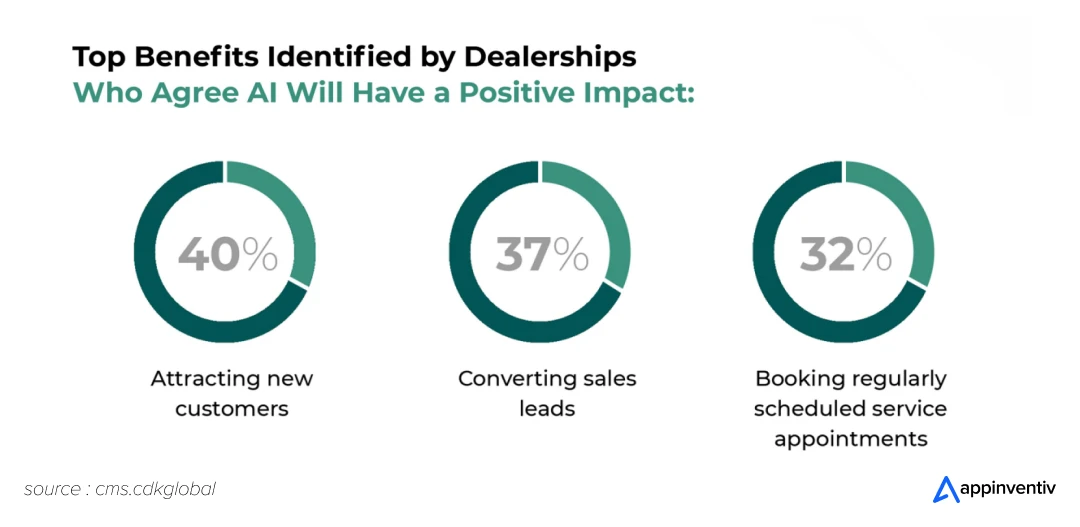
Here are some other benefits of AI-powered dealerships:
Generative AI-powered Recommendations
Modern AI systems analyze the potential buyers’ browsing history, lifestyle patterns, and budget to suggest vehicles that actually make sense for their lives. Instead of being shown every car on the lot, they get a curated selection based on what similar customers with their profile have loved.
No more wasting time looking at sports cars when you need family transport, or being pitched luxury features when you’re budget-conscious. The AI learns from thousands of customer profiles to make genuinely useful recommendations.
AI Driven Chatbots & Virtual Assistants
Dealership chatbots now handle complex questions 24/7, checking inventory, explaining financing, and scheduling test drives. They remember previous conversations, so your customers don’t have to repeat their requirements every time and get frustrated. Happy customers are repeat customers.
These systems can compare trim levels, explain warranty coverage, and provide trade-in estimates instantly. No more waiting around for callbacks or playing phone tag with busy salespeople.
Smart Financing Tools
AI-powered financing evaluates the creditworthiness of buyers almost instantly, considering factors beyond just credit scores. This means faster approvals and often better rates than traditional methods.
The technology models multiple payment scenarios to find arrangements that work for your situation. Pre-approval happens before you visit the lot, giving you real negotiating power and speeding up purchases.
Dynamic Pricing & Offers
AI monitors market conditions and competitor pricing to suggest fair values in real-time. Pricing becomes transparent and personalized. In this way, price-sensitive customers can see different incentives than those who need immediate delivery.
Trade-in valuations consider local demand and current inventory needs, providing more accurate offers than generic Blue Book values. The result is fair pricing without exhausting negotiations.
AI Integration in the Automotive Industry: 4 Leading Car Companies Driving Innovation
AI is steadily transforming the automotive landscape, bringing smarter systems and enhanced capabilities to vehicles and operations alike. Several global automotive companies have already begun adopting AI automotive solutions to stay ahead of the curve. Here’s a look at four such industry leaders embracing this shift.

Tesla
Tesla stands at the forefront of automotive artificial intelligence, transforming vehicles’ operations through real-time data processing, neural networks, and smart decision-making capabilities. Its AI-driven systems enable features like self-parking, lane assistance, and auto-pilot, setting a high benchmark for intelligent EVs. Tesla’s continued investment in AI ensures its vehicles evolve with each update, delivering smarter, safer experiences to users worldwide.
Bonus Read: How Much Does It Cost to Build an Advanced Driver Assistance System Like Tesla Autopilot
BMW
BMW is a strong example of how generative AI in automotive is shaping the future of design and development. The company uses AI to create vehicle prototypes and enhance manufacturing efficiency and customer experience. Its integration of AI spans more than 400 applications, including energy management, quality control, and intelligent in-car assistants, demonstrating the brand’s commitment to AI-led innovation.
Wamyo
Waymo is a leading force in AI for autonomous vehicles, pioneering the use of AI in self-driving vehicles, delivery vans, and autonomous trucks. Its AI systems interpret sensor data, traffic patterns, and real-time conditions to navigate safely without human input. Waymo sets the standard for truly driverless mobility solutions with millions of autonomous miles driven.
Nvidia
Nvidia is critical in advancing AI for automotive industry solutions by providing powerful hardware and software platforms that support AI applications in vehicles. Its chipsets and AI models help process massive amounts of sensor data for tasks like real-time object detection, driver monitoring, and navigation. Nvidia’s technology enables automakers to build smarter, safer, and more responsive cars.
Future of AI in the Automotive Industry
AI is rapidly becoming the cornerstone of transformation in the automotive industry. The automotive landscape after a decade will not just feature smarter cars, it will give birth to an entirely new species of mobility.
Tomorrow’s vehicles will be cognitive entities that learn, predict, and evolve alongside human needs. The numbers back up this transformation. As McKinsey projects, 12% of passenger vehicles will operate with Level 3+ autonomous intelligence by 2030. But here’s what gets really interesting: we’re moving from basic automation to full vehicle automation and connectivity. It is a stage where AI gets so deeply integrated that the boundary between human intention and machine execution will disappear entirely.
What is Full Vehicle Automation & Connectivity
The future isn’t just autonomous; it’s about fully connected cars that “think,” “talk,” and “adapt” in a fully connected mobility ecosystem. Tomorrow’s vehicles will exist in constant dialogue with their environment, creating a symphony of coordinated intelligence. In McKinsey’s 2023 Global Automotive Connectivity Executive Survey, 55% of auto executives ranked connected cars as one of the top two trends shaping the future of mobility.
Innovations by AI Pioneers in Automotive and Connected Ecosystem Vision
Leading this charge, companies like Tesla and Waymo aren’t just building self-driving cars anymore. They’re creating machines that react faster than human reflexes, while traditional automakers team up with tech giants to build vehicles that actually get smarter over time. This collaboration is reshaping everything from how cars are built to how they behave on the road.
What’s actually changing with the adoption of AI in automotive industry:
- Smart Factories: Manufacturing lines that think ahead and solve problems before they happen
- Cars That Fix Themselves: Your vehicle will book its own service appointments and order parts before anything breaks
- Mood-Reading Dashboards: Interfaces that pick up on how you’re feeling and adapt accordingly
- Mobile Power Stations: Cars that share energy with your house and the electrical grid
- Accident Prevention: Safety systems that spot danger patterns humans might miss
“The future is going to be good for the AIs regardless; it would be nice if it would be good for humans as well.”
By Ilya Sutskever (Co-founder, OpenAI)
Implementation Challenges of AI in the Automotive Industry and Solutions to Overcome Them
Implementing AI in the automotive industry holds massive potential, but it has its hurdles. From high development costs to data privacy concerns, companies face several challenges along the way. Let’s look at some of the top challenges and solutions to tackle those.
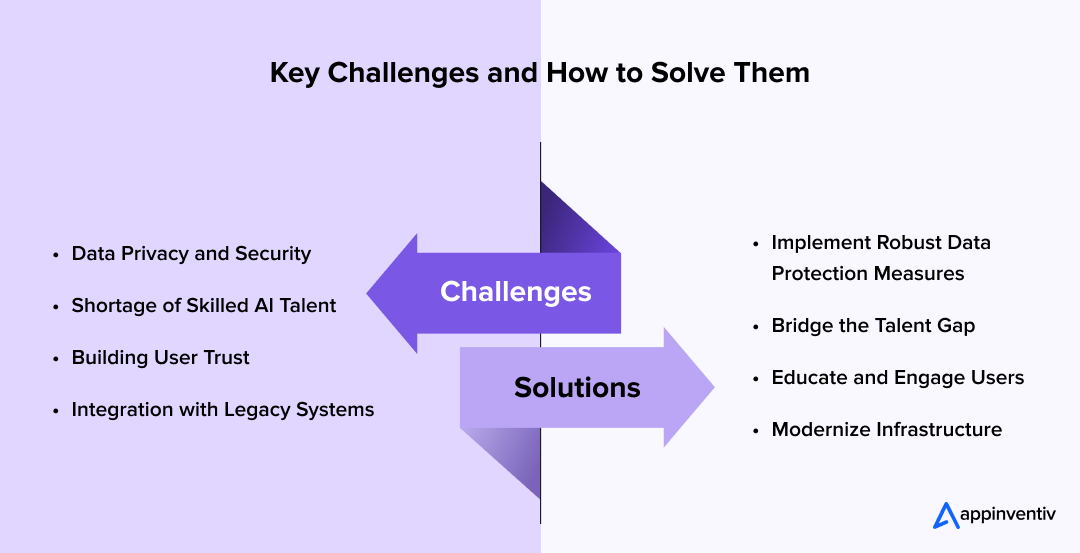
Data Privacy and Security
AI systems process vast amounts of sensitive driver and vehicle data, raising concerns around data breaches, misuse, and regulatory compliance. Any breach in data security could damage brand reputation and lead to hefty fines. User consent and transparency are increasingly under scrutiny.
Solution: Enforce strong data encryption, ensure compliance with data protection laws (e.g., GDPR), conduct regular audits, and adopt cybersecurity best practices to build user trust.
Using decentralized data storage and anonymization techniques helps mitigate data breach risks while maintaining data utility.
Shortage of Skilled AI Talent
There’s a high demand for professionals who understand AI and automotive systems, making it tough to build in-house teams. Hiring delays and steep salary demands slow down project timelines. Talent is often drawn to big tech firms, creating a gap for automakers.
Solution: Upskill existing employees through training programs, collaborate with academic institutions, and outsource specific AI functions to experienced vendors. Encouraging internship pipelines and contributing to open-source AI projects can also attract emerging talent to your organization.
Building User Trust
Drivers may hesitate to adopt AI-powered features like autonomous driving due to safety fears or a lack of understanding. High-profile accidents have intensified public skepticism, and many users are unaware of how AI systems work.
Solution: Focus on user education, demonstrate safety through real-world testing and transparent communication, and introduce AI features gradually to build confidence. Incorporating user feedback into updates and offering clear onboarding experiences can improve trust and adoption.
Integration with Legacy Systems
Many automakers still rely on legacy systems incompatible with modern AI technologies. Integrating AI into outdated infrastructures can lead to inefficiencies, delays, and added complexity during deployment.
Solution: Gradually modernize legacy systems by adopting modular, API-first architectures that allow AI components to plug in seamlessly. Use middleware solutions to bridge the gap during transition, and prioritize scalable platforms that can evolve with your AI strategy.
Embrace the Power of AI in Your Automotive Business with Appinventiv
The inclusion of AI in the automobile industry has been a game-changer. It helps automobile companies design and build new prototypes, increase supply chain efficiency, reinforce drivers’ safety on the road, improve passenger experience, assist in driving more efficiently, and enable predictive maintenance of factory equipment and vehicles on the road.
It is high time for the automotive industry to give AI a front seat in business and leverage this technology to augment possibilities and reach its ultimate business goals.
As a trusted AI development services provider, Appinventiv is dedicated to building innovation-driven solutions that make your automobile business smart and efficient. From intelligent driver assistance systems to predictive maintenance and connected vehicle platforms, we harness AI’s full potential to future-proof your automotive offerings.
With a track record of delivering 3,000+ digital products across industries and a team of 1,600+ tech experts, we have partnered with leading global automotive and mobility brands to design scalable AI-powered platforms. Our work has been recognized through prestigious accolades like Deloitte Tech Fast 50 – Tech Company of the Year in 2023 and 2024, Times Business Awards 2023, Clutch Global Spring Award 2024, and so on. This reflects our commitment to excellence.
We are a leading automotive software development company, providing state-of-the-art generative AI development services worldwide. No matter what your plan or project requirements are, our top-notch custom AI solutions will perfectly integrate with your business goals.
Get in touch with us now to discover how we can help you integrate AI in the automotive industry.
FAQs
Q. What is AI in the automotive industry?
A. AI refers to a machine’s ability to perform tasks that typically require human intelligence, such as learning, reasoning, decision-making, and problem-solving. In the automotive sector, AI transforms how vehicles are built, driven, and experienced. A common question today is “how is AI used in cars?” The answer lies in its wide range of applications from improving vehicle performance and driver safety to enhancing the passenger experience through real-time data analysis and intelligent decision-making.
In simple terms, it’s the use of artificial intelligence to rethink how vehicles are built, sold, and driven. Automakers apply technologies like computer vision, robotics, speech analytics, natural language processing, and business intelligence in automotive industry to build safer and more efficient cars. This helps improve manufacturing lines, supply chain operations, and dealership interactions.
Q. What are the latest generative AI trends in the automotive industry?
A. The latest generative AI trends in automotive include rapid prototyping and design optimization, personalized vehicle configurations, intelligent manufacturing processes, and advanced conversational AI for customer service.
Generative AI is supporting faster, more intuitive, and more efficient vehicle design by supporting rapid prototyping and optimization of components. Key developments include AI-powered design tools that can generate thousands of component variations, personalized user interfaces that adapt to individual preferences, and manufacturing systems that optimize production in real-time.
Other significant trends include the integration of large language models for natural vehicle interactions, AI-generated marketing content for dealerships, and predictive maintenance systems that can forecast component failures with increasing accuracy. The technology is also enabling mass customization at scale, allowing manufacturers to offer personalized vehicle features without traditional cost penalties.
Q. What is predictive maintenance in the context of AI automotive?
A. Predictive maintenance powered by AI and machine learning in automotive can foresee potential issues before they become critical. This anticipatory approach ensures maintenance is performed just in time, reducing unplanned downtime, lowering repair expenses, and prolonging vehicle lifespan, thereby improving overall operational efficiency and reliability.
Q. How does AI contribute to cost savings in the automotive industry?
A. AI drives cost savings in the automotive industry by enhancing production efficiency, reducing waste, and improving quality control. Through predictive maintenance, AI prevents unexpected breakdowns, minimizing costly downtime. It also optimizes supply chain management by accurately predicting demand and reducing surplus inventory.
Additionally, AI-driven automation in manufacturing reduces labor costs and accelerates production timelines, further increasing efficiency and boosting profitability across the automotive sector.
Q. How is AI used in cars?
A. AI in cars is used in various ways. Think of driver-assistance systems that help you stay in your lane, smart cruise control that adjusts speed automatically, or predictive alerts that suggest servicing before a breakdown happens. Inside the cabin, AI personalizes settings like mirrors, seats, or music and even learns your driving habits to make each trip smoother.
Q. What is the future of AI in vehicles?
A. The road ahead is moving toward cars that drive and think almost on their own. By the next decade, many passenger vehicles will include higher levels of autonomy, allowing minimal driver involvement. Cars will talk to each other, communicate with traffic signals, and even schedule their own maintenance. The idea of a vehicle as merely a means of transportation is giving way to a vision of cars as intelligent companions on the road.
Q. What are the new trends in the automotive industry?
A. Here are some of the key AI trends in the automotive industry:
- Rapid adoption of AI-powered electric vehicles (EVs) is backed by battery innovation and government incentives.
- Growth of connected cars that interact with other vehicles, infrastructure, and smart devices.
- Wider rollout of AI-driven safety systems, including driver monitoring and advanced driver assistance.
- Use of generative AI for faster design, mass customization, and smarter dealership marketing.
- Expansion of shared and green AI mobility models, reshaping how people own and use cars.
Q. How are automotive companies using generative AI?
A. Generative AI is proving useful in both design and retail. For example, engineers can test hundreds of variations of a car component digitally before building a prototype. Dealerships are using the technology to recommend vehicles that better match a buyer’s profile. Beyond that, it’s helping companies forecast supply needs, speed up product development, and bring a higher level of personalization to customers.


- In just 2 mins you will get a response
- Your idea is 100% protected by our Non Disclosure Agreement.
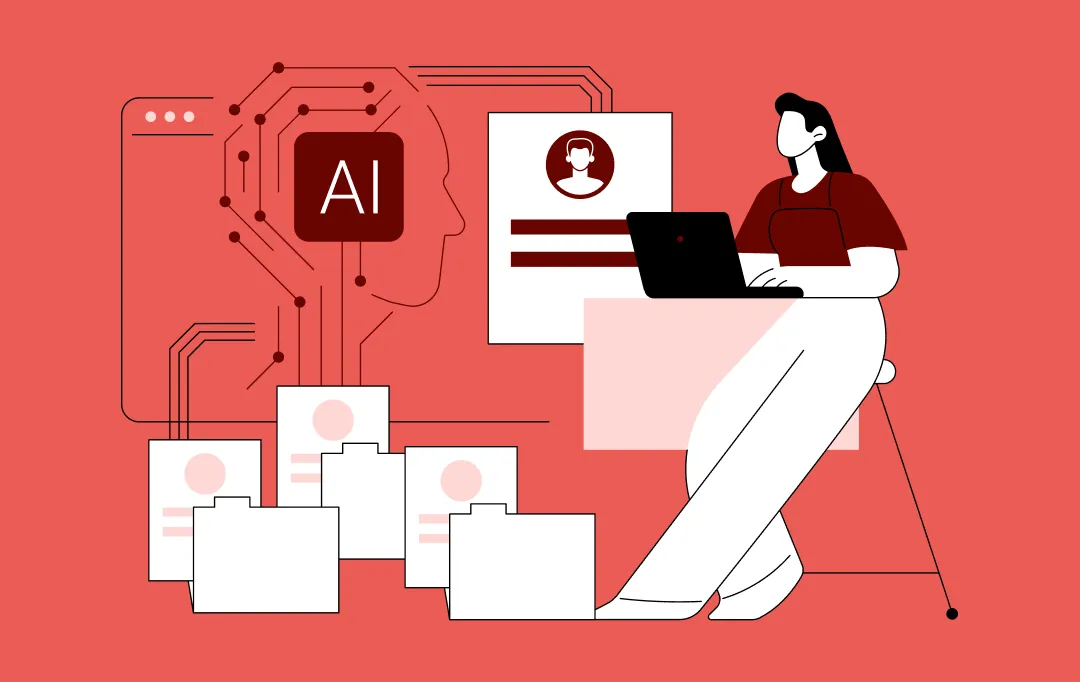
AI Predictive Analytics: The Executive's Blueprint for Proactive Growth
Key takeaways: Predictive intelligence shifts leadership from reacting to events toward anticipating outcomes Market adoption, infrastructure readiness, and data availability make this the right time to scale predictive capability Continuous, AI-powered prediction delivers significantly higher value than static historical analytics Business impact emerges only when predictive systems are embedded into core operations and workflows Organizational…
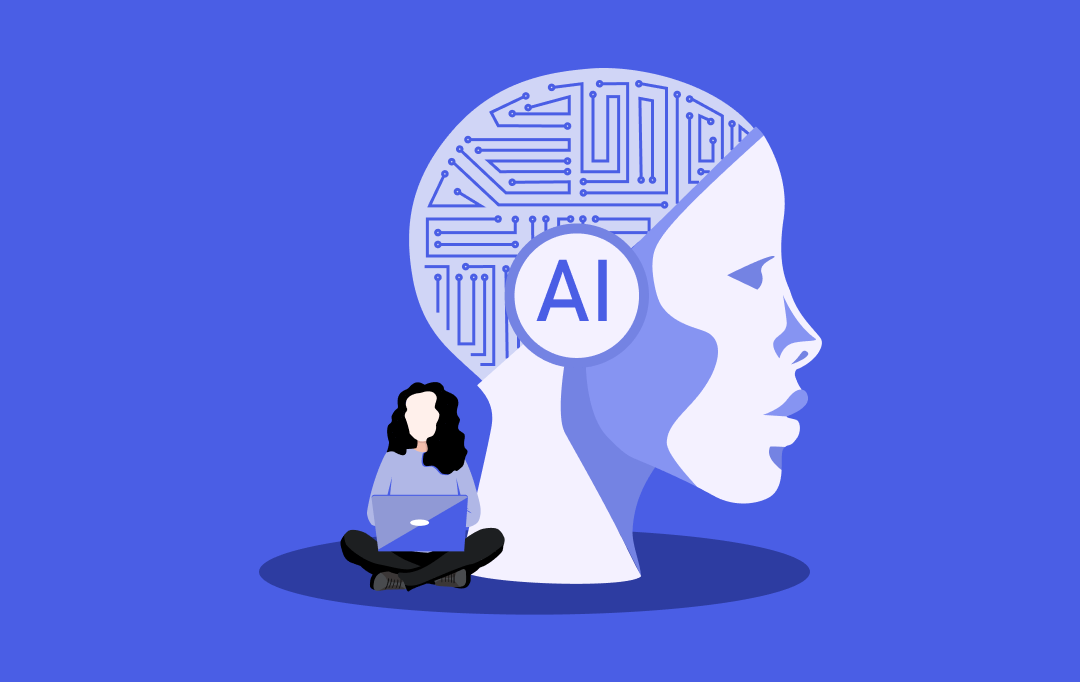
The Emergence of AI-driven Robotics: 14 Ground-Breaking Use Cases in Enterprises
Key Takeaways AI-driven robotics has shifted from automation tools to core operating infrastructure for enterprises. Intelligent robots now make decisions, not just execute instructions. Enterprises are adopting AI robotics at scale, not as pilots. Business impact shows up first in productivity, quality, and operational resilience. Integration and governance matter more than hardware. Companies that delay…

Why Enterprises Need AI Strategy Consulting in Dubai
Key takeaways: Dubai is moving fast with AI adoption. But many enterprises still struggle to move beyond pilots and achieve real business results. AI strategy consulting gives leaders a clear plan. From use-case selection to data readiness, so enterprise AI initiatives stay on track and within budget. AI consulting in Dubai helps enterprises reduce compliance…












